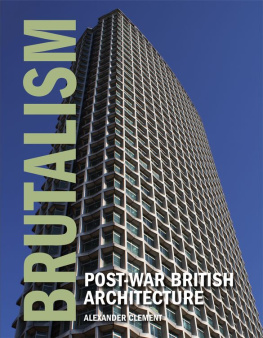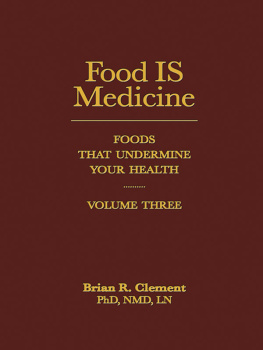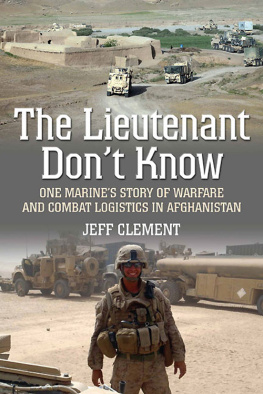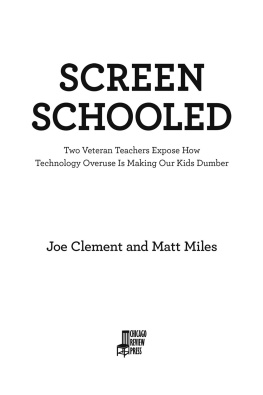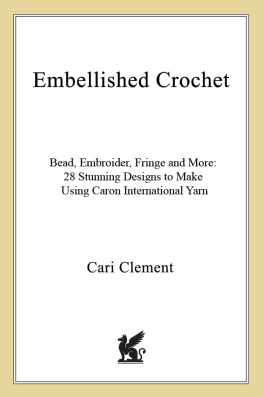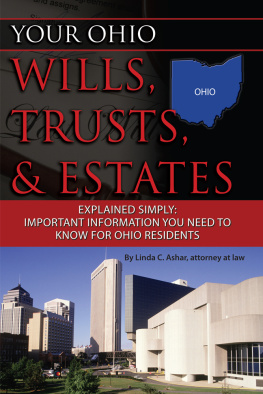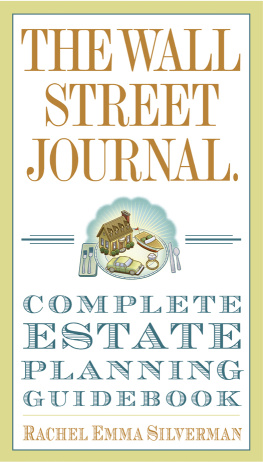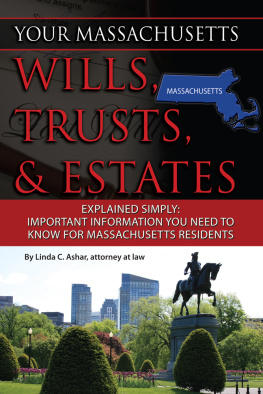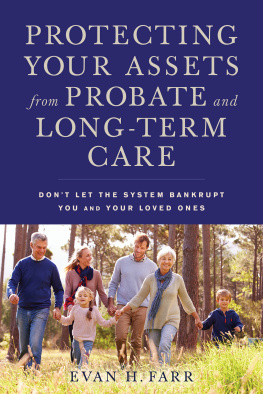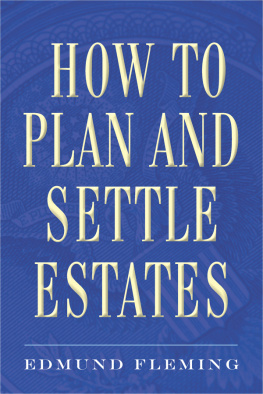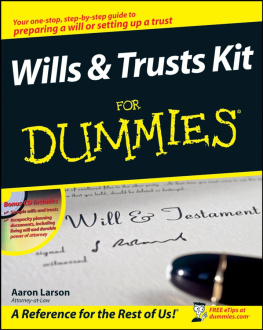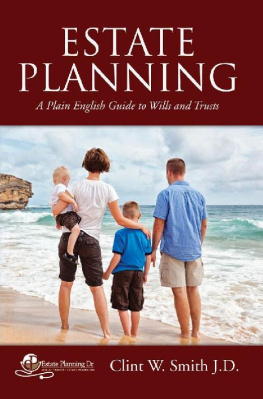How to Die Without a Lawyer
Also by Mary Clement
Freedom to Die:
People, Politics, and the Right-to-Die Movement
How to
Die Without
a Lawyer
A PRACTICAL GUIDE TO
CREATING AN ESTATE PLAN
WITHOUT PAYING LEGAL FEES
Mary Clement

HOW TO DIE WITHOUT A LAWYER. Copyright 2000 by Mary Clement. All rights reserved. Printed in the United States of America. No part of this book may be used or reproduced in any manner whatsoever without written permission except in the case of brief quotations embodied in critical articles or reviews. For information address St. Martins Press, 175 Fifth Avenue, New York, N.Y. 10010.
Designed by Kate Nichols
ISBN: 978-0-312-24401-9
ISBN: 0-312-24401-0
10 9 8 7 6 5 4 3 2
To my son, Jamie,
who has been steadfast in his support
throughout the journey
I have done my best to give you accurate information in this book. However, laws are constantly changing and are open to various interpretations, often within the same state. This is the beauty and the peril of the law. If you use this book, it is your responsibility to verify that the facts and the law contained herein are applicable to your situation. The facts of each individual case are different and may change the application of the law. If you want the security of legal advice guaranteed by warranty, please see a lawyer.
Contents
PART I:
Laying the Groundwork for Creating a Will
PART II:
Creating, Revoking, or Changing a Will
PART III:
Taking Precautions Against Mental Incapacity
PART IV:
Avoiding Probate
PART V:
AppendixEstate Planning Documents
How to Die Without a Lawyer
Introduction
If a man dies and leaves his estate in an uncertain condition, the lawyers become his heirs.
Edgar Watson Howe
WHY YOU NEED THIS BOOK
Lawyers love estates. Especially big estates. And most especially big probate estates. Probate is the procedure that each state requires to settle legally the estate of a deceased person and to transfer his probate propertythat is, property that stands in the deceaseds name alone at the time of death or that will require action on the part of the executor to transfer. All property passing under a will is probate property. The bigger the probate estate, the bigger the legal fee. It only makes sense, therefore, to avoid probate and thereby to avoid lawyers. And that is exactly what this book will help you do. You will act as your own lawyer, so that neither you nor your beneficiaries will incur the exorbitant expenses that lawyers charge. You will die with nary a lawyer in sight.
Even worse than wasting money on lawyers is what happens if you dont execute a will or use some other valid method to transfer your property after you die. Your property will be distributed to your spouse and children under the intestate succession law of your state. Thus the legal system steps in to ensure that the proper assets are distributed to the intended beneficiaries, to interpret potentially harmful language errors, to interpret ambiguities, to guess how you feel about futile medical treatment, to appoint a stranger to manage your finances, and to comfort your children when the judge assigns a stranger to raise your children and handle their property. If you have neither spouse nor child and no relatives qualify under law to inherit your property, it will go to the governmentnot a happy resting place for the rewards and remains of a lifetime of work and sacrifice. Without any planning, you are inviting a swarm of expensive professionals to devour the many thousands of dollars that would otherwise go to your loved ones.
The curious thing is that for all our loathing of lawyers, we fail to take the very steps that will help us avoid themand fairly easy steps they are. Think about it. Approximately 75% of Americans die without even a will, to say nothing about other estate planning devices. Roughly 85% fail to execute a living will or health care proxy, too many ignoring the reality that they may spend countless years and thousands or hundreds of thousands of dollars hooked up to life-support systems they vow they would never want.
When we do take action, we fall for the planning that will benefit our lawyer upon our death. In thirty years of signing wills and their codicils, no lawyer ever mentioned the serious drawbacks of probate to me. The words living trust never crossed a pair of smiling lips. Avoiding probate is not in their financial best interest, since probate is such a cash cow for attorneys.
Many people consider estate planning a matter of executing a will. In reality, a will is an important but small portion of a well-executed estate plan, and merely executing a will ignores the enormous benefits of nonprobate property. Passing your estate through your will is the most expensive, vulnerable, and time-consuming way to pass property at death. In reading this book, you will learn how to write your own will, avoid probate, and create a living trust, as well as the advantages and disadvantages of other probate-saving devices.
You will be advised to take a simple precaution that too many lawyers either accidentally or intentionally overlook: the inclusion of the no-contest clause. The absence of this clause can subject the estate to unnecessary litigation by opening the door to unsatisfied beneficiaries. Legal disputes over a will can be as financially and emotionally demanding as any dispute you might have the misfortune to experience.
The legal establishment has succeeded in mystifying the process of writing even the simplest of wills. People avoid writing their own will for fear of their imagined inadequacies. On the other hand, going to an attorney, they correctly suspect, will cost them a considerable fee. The result is either inaction or the lawyers becoming the beneficiaries. How to Die Without a Lawyer demystifies the process, and, for a small fraction of the cost of hiring a lawyer, it will provide the readers beneficiaries with an estate easy to settle without an attorney.
The easiest estates to settle are the ones that are well planned during the lifetime of the deceased. Comprehensive estate planning includes deciding who will inherit your property, deciding who will take care of your young children and their inheritance if you die while they are still minors, putting procedures and devices in place to minimize probate costs at your death, attempting to reduce federal and state estate taxes, and arranging for someone to make medical and financial decisions on your behalf in the event that you become incompetent and unable to make these decisions for yourself. How to Die Without a Lawyer reveals the secrets of trusts and estates law, enabling you, the reader, to produce the same work as the professionals, without the legal fees and with the added benefit of your estate being more financially advantageous to your beneficiaries than to your lawyer.
At no time in history, however, is there more need for affairs to be in order than now. The Dow Jones has become part of popular culture, and half of American households now have exposure to the stock market, either directly, through mutual funds, or through the ubiquitous 401(k) retirement plans. The record-setting advances of the stock market in recent years have increased the involvement of many Americans in the market and bestowed material bounty as never before. The runup in the stock market since 1994 has added an extra $10 trillion to the assets of American households.
Just as striking are the technological advances that have changed the face of stock trading as well as the face of death. A decade ago, anyone who wanted to buy or sell a stock had to call his broker to get the price, and then pay a hefty sum to complete the trade. Today, stock prices are available to anyone with a television, radio, or computer, and investors can trade on-line for as little as $10 a transaction. The striking result of these changes is that more people have more assets. More assets and more responsibilities. More need for estate planning.
Next page

